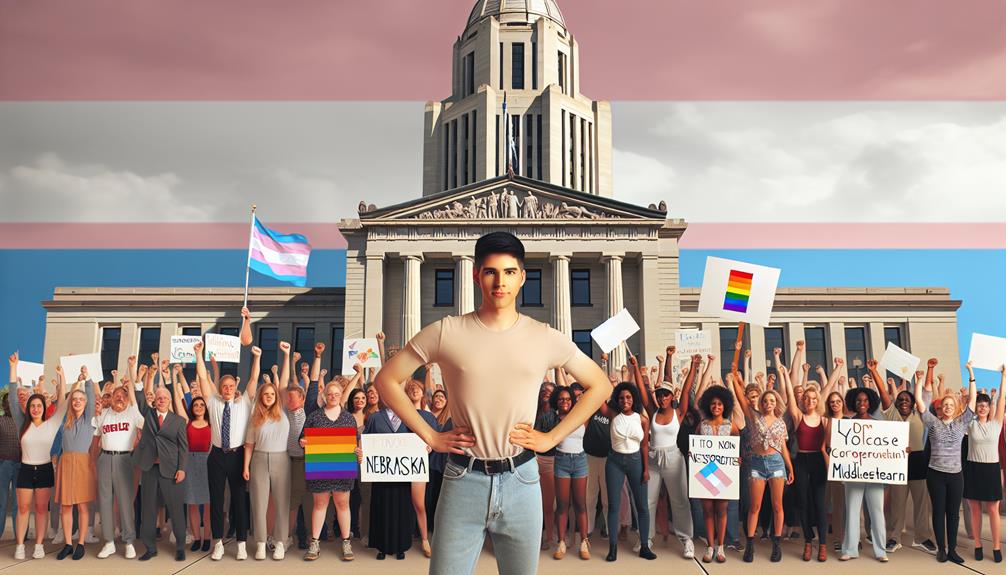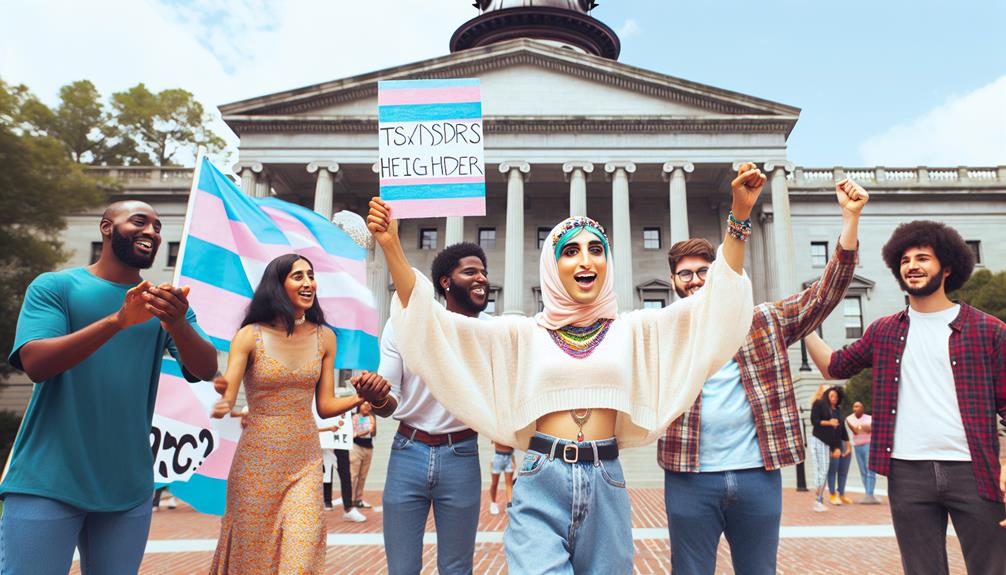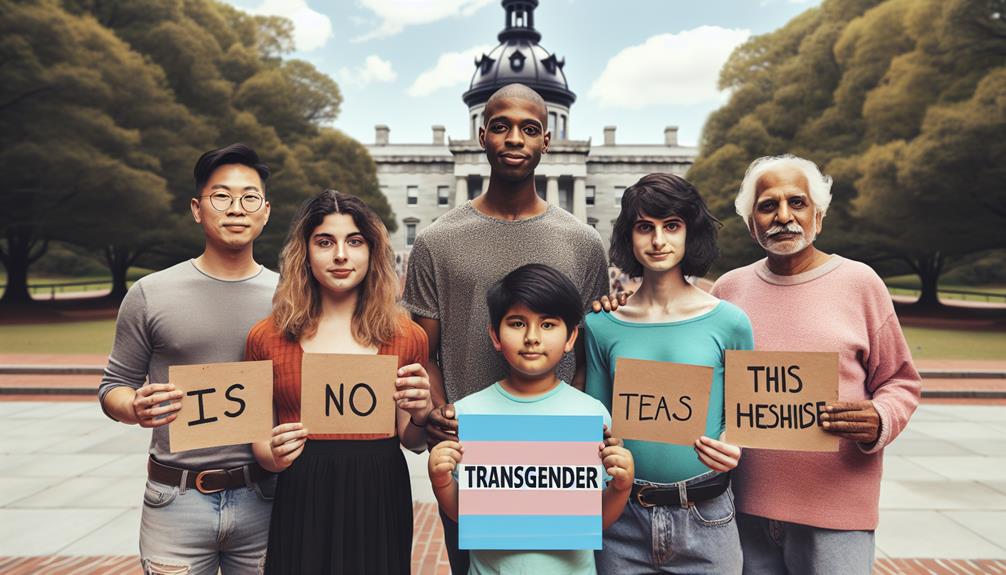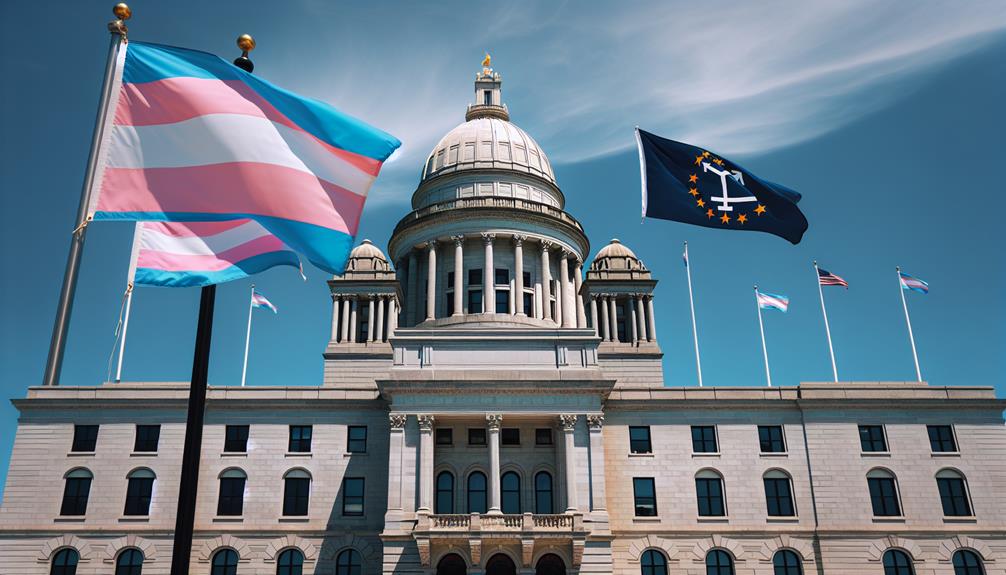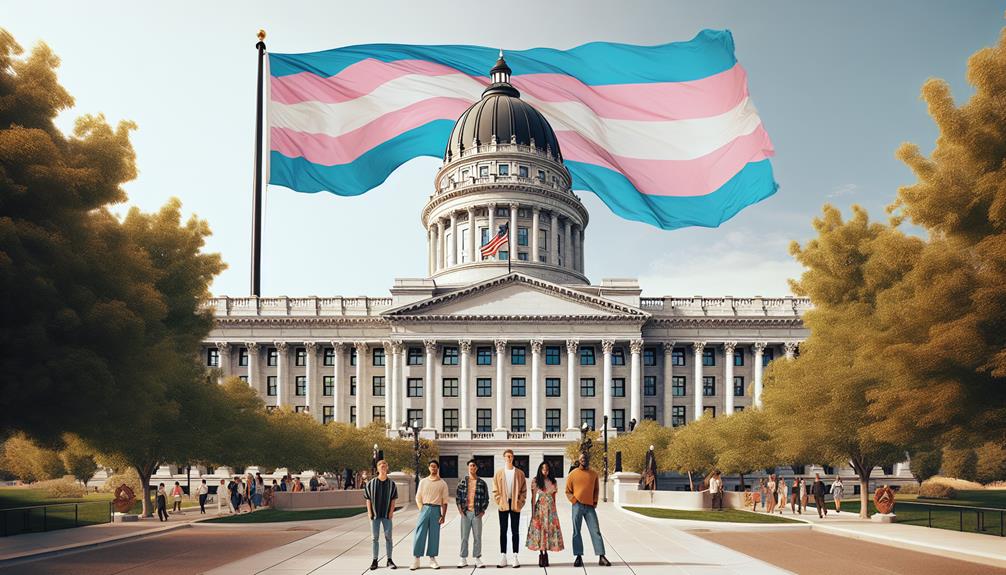
Wrestling with the implications of Utah's restrictive bathroom legislation, Amelia's story sheds light on the ongoing battle for transgender rights in the state.
Table of Contents
ToggleAmelia, a transgender woman in Utah, faces the daily struggle of navigating public spaces due to the state's restrictive legislation on bathroom and locker room access.
The recent bill has sparked heated debates and advocacy efforts from both opponents and supporters, with the fate of the transgender community hanging in the balance.
As the issue continues to unfold, it is crucial to understand the multifaceted impact of such legislation and the ongoing fight for transgender rights and inclusion in Utah.
Key Takeaways
- Utah's Republican-controlled Legislature has passed legislation restricting bathroom and locker room access for transgender individuals based on sex assigned at birth.
- Obtaining accurate identification documents that match a transgender individual's gender identity is a complex and time-consuming process in Utah.
- The recent transgender bathroom bill in Utah raises concerns about the rights and inclusion of transgender individuals in sports.
- Advocacy efforts in Utah are focused on promoting inclusive workplace policies and safeguarding the rights of transgender people.
Legislative Battles and Healthcare Access
Legislative battles and healthcare access for transgender individuals in Utah are a contentious and pressing issue in the state's political landscape.
The recent legislation passed by Utah's Republican-controlled Legislature requiring people to use bathrooms and locker rooms in public schools and government-owned buildings that match their sex assigned at birth has sparked heated debates. This law places significant limitations on transgender individuals' access to facilities that align with their gender identity.
Furthermore, the requirement for transgender individuals to prove they'd gender-affirming surgery and changed the sex on their birth certificate to defend themselves against complaints adds an additional layer of complexity and difficulty. The legislation also raises concerns about the rights and safety of transgender students in public schools.
While some lawmakers argue that the legislation is necessary for safety, opponents stress that targeting behaviors rather than individuals would be more effective. The lack of addressing funding for required upgrades to government buildings also presents a significant challenge.
This legislative battle highlights the need for empathetic and inclusive policies that ensure equitable access for all individuals, regardless of their gender identity.
Challenges in Obtaining Identification Documents
Challenges in obtaining identification documents present significant barriers for transgender individuals in Utah, impacting their ability to navigate daily activities and access essential services. The following are key points to consider:
- Legislative Barriers: Utah legislation currently requires individuals to use identification documents that match their sex assigned at birth, creating a significant obstacle for transgender individuals.
- Complex Process: The process for transgender individuals to update their identification documents in Utah is complex and time-consuming, adding further frustration and difficulty to an already challenging situation.
- Daily Impacts: Obtaining identification documents that accurately reflect their gender identity is crucial for transgender individuals to carry out everyday activities, such as banking, travel, and accessing healthcare services.
- Advocacy Efforts: Advocates and organizations in Utah are actively working to streamline the process for transgender individuals to obtain identification documents that align with their gender identity, recognizing the importance of this issue for the transgender community.
The challenges in obtaining accurate identification documents significantly impact the lives of transgender individuals in Utah, highlighting the need for greater understanding, support, and streamlined processes to ensure their access to essential services and protection of their rights.
Transgender Participation in Sports
Transgender individuals in Utah face ongoing discussions and decisions regarding their participation in sports, with potential implications for their inclusion and access to athletic opportunities.
The recently passed transgender bathroom bill in Utah has sparked concerns about the rights of transgender individuals in sports. The bill requires people to use facilities that align with their sex assigned at birth, potentially impacting the ability of transgender individuals to participate in sports in a manner consistent with their gender identity.
While the legislation is primarily focused on restroom use, its implications for sports involvement have raised significant concerns within the transgender community. This bill could lead to exclusion and discrimination against transgender athletes, affecting their ability to compete in a manner that aligns with their gender identity.
The lack of clarity and inclusivity in the legislation may hinder transgender individuals' access to athletic opportunities in Utah. As discussions continue, it's essential for the state to consider the rights and inclusion of transgender individuals in sports, ensuring that all people have the opportunity to participate in athletics in a manner that respects their gender identity.
Fight for Inclusive Workplace Policies
Amid the ongoing discussions about the impact of recent legislation on transgender individuals' participation in sports, there's a growing need for inclusive workplace policies that support and affirm the rights of all employees, regardless of their gender identity.
The Utah Legislature recently passed a measure requiring people to use bathrooms and locker rooms in public schools and government-owned buildings that match their sex assigned at birth. Transgender individuals are now able to defend themselves against complaints by proving they've had gender-affirming surgery and changed the sex on their birth certificate. However, the legislation doesn't provide funding for upgrades to existing government buildings.
This situation has sparked a fight for inclusive workplace policies to safeguard the civil rights and liberties of transgender people. The need for protections in athletics has brought attention to the broader issue of powerful policymakers infringing on Utah's domestic violence and sexual assault programs, as they prevent the state from receiving federal funds for sexual and domestic violence programs.
These developments underscore the urgency for comprehensive and inclusive workplace policies that prioritize the well-being and rights of all employees.
Efforts Toward Equality and Acceptance
Efforts toward equality and acceptance are vital for creating an inclusive and supportive environment for all individuals, regardless of their gender identity. The recent actions taken by the Utah Legislature, such as passing a bill that restricts bathroom access for transgender individuals, have raised concerns about the impact on the transgender community.
This legislation requires individuals to use bathrooms that align with their sex assigned at birth, potentially creating unsafe and discriminatory situations for transgender individuals. Additionally, the legislation includes provisions that affect transgender students' participation in athletics, threatening their ability to participate in sports aligned with their gender identity.
Such measures not only contradict the principles of equality and acceptance but also raise questions about compliance with Title IX and the potential loss of federal funding for public facilities. It's imperative for Utah to reconsider these laws and prioritize the well-being and rights of transgender individuals.
Ensuring that they have equal access to bathrooms and changing facilities, and aren't discriminated against in any aspect of public life.
Frequently Asked Questions
Why Did Utah Ban Gender-Affirming Care?
Utah banned gender-affirming care due to a measure passed by the Republican-controlled Legislature, requiring people to use bathrooms and locker rooms in public schools and government-owned buildings that match their sex assigned at birth. This measure, pending Governor Spencer Cox's decision, restricts access for transgender individuals, with limited exceptions.
The bill's supporters argue it's necessary for safety, while opponents emphasize the distinction between perpetrators of sexual assault and the transgender community.
Conclusion
In conclusion, the Utah Transgender State of Affairs highlights the ongoing struggles for transgender individuals to access basic facilities and rights.
It's important to note that 78% of transgender youth experience discrimination at school, according to the National Center for Transgender Equality.
It's crucial for society to advocate for inclusive policies and acceptance to create a more equitable and supportive environment for all individuals.
Profile Author / Editor / Publisher
- Dora Saparow
- Dora Kay Saparow came out in a conservative Nebraskan town where she faced both misunderstanding and acceptance during her transition. Seeking specialized support, she moved to a big city, where she could access the medical, legal, and social resources necessary for her journey. Now, twelve years later, Dora is fully transitioned, happily married, and well-integrated into society. Her story underscores the importance of time, resources, and community support, offering hope and encouragement to others pursuing their authentic selves.
Latest entries
 News and AdvocacyNovember 14, 2025Rainbow Victories: 2025’s Most Pro-LGBTQ+ States Revealed
News and AdvocacyNovember 14, 2025Rainbow Victories: 2025’s Most Pro-LGBTQ+ States Revealed News and AdvocacyNovember 14, 2025Transgender Sanctuary States: Protecting Rights, Providing Hope
News and AdvocacyNovember 14, 2025Transgender Sanctuary States: Protecting Rights, Providing Hope Featured PostsNovember 13, 2025When Restroom Policing Backfires: The Hotel That Went Too Far
Featured PostsNovember 13, 2025When Restroom Policing Backfires: The Hotel That Went Too Far Featured PostsNovember 13, 2025Sex, Safety, and Seduction: A Trans Girl’s Guide to Hookups
Featured PostsNovember 13, 2025Sex, Safety, and Seduction: A Trans Girl’s Guide to Hookups


